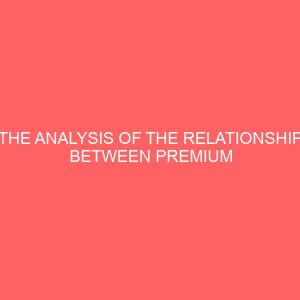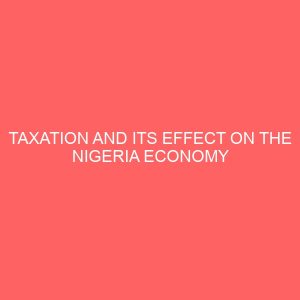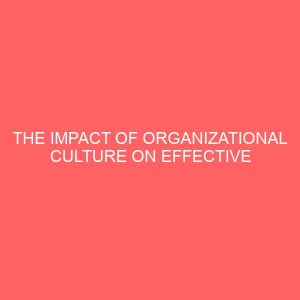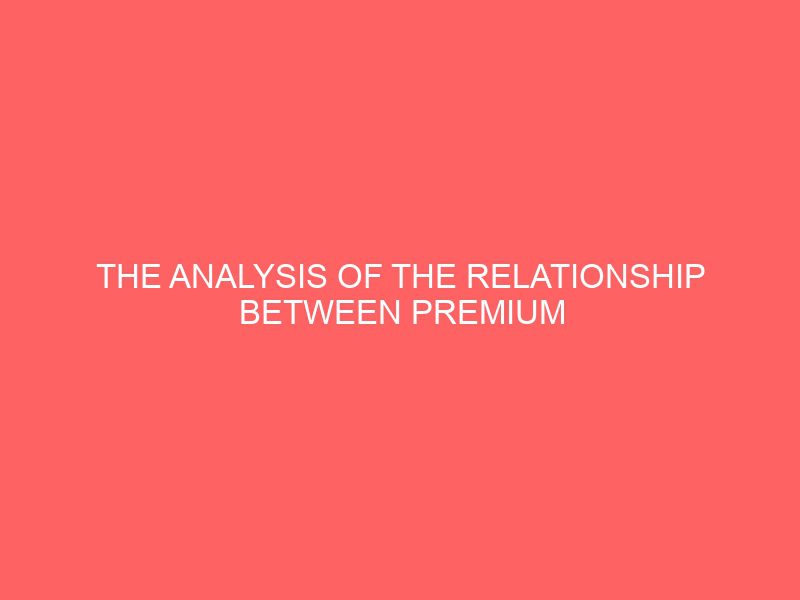Description
ABSTRACT
Insurance industry plays active in economic development of any nation. No developed or developing nation can do without insurance. For the proposed insured to be covered there must be a consideration. It is this consideration that is called premium, the law of Insurance States that no cover without premium on the other hand, as far as insurance is concerned. There is no tangible product to test, what the insured purchases is just a promise to pay a claim arising after the purchase and consistent with the policy sold. The actual test therefore does not come until such a claim comes up from the insured of other party concerned. If the insurer at that time makes good his promise, the insured is satisfied that he has made a good bargain. But where however the insurer fails, the insured is disappointed. This disappointment may result in serious consequences to the insurer. Claim settlement is a very vital issue that may cause dispute between the insurers and the policy holders. Infact most of the disputes that arises in insurance contract has to do with settlement of claims and quantum to be paid, so an important factor that distinguishes a good insurance company is it claims settlement services. Therefore there is a big relationship between premium and claim settlement.
TABLE OF CONTENT
Title page
Dedication
Acknowledgement
CHAPTER ONE
INTRODUCTION
1.1 Background of Study
1.2 Statement of the Problem
1.3 Objectives of the Study
1.4 Research Questions
1.5 Research Hypothesis
1.6 Significant of the Study
1.7 Scope and Limitations of the Study
1.8 Definition of Operational Terms.
References
CHAPTER TWO
REVIEW OF RELATED LITERATURES?
2.1 An Overview
2.2 Historical Development of Premium in Nigeria Insurance Industry
2.3 The Development of Insurance Industry in Nigeria
2.4 The Role of Premium and Claim Settlement in the Development of Nigeria Insurance Industry.
2.5 Meaning and Concept of Premium and Claim Settlement
2.6 The Impact of Insurance Premium on Insurance Industry.
2.7 The impact of Claim Settlement on Nigeria Insurance Industry.
2.8 Problems Associated with Insurance Premium and Claim settlement.
References
CHAPTER THREE
RESEARCH METHODOLOGY AND DESIGN
3.1 An Overview
3.2 Sources of Data
3.2.1 Primary Source of Data
3.2.2 Secondary Data
3.3 Population of Study
3.4 Sample Size and Sampling Techniques
3.5 Instrument used in selecting Sample size
3.6 Validity and Reliability of Instrument Used
3.7 Method of data Presentation and Analysis
CHAPTER FOUR
DATA PRESENTATION, ANALYSIS AND DISCUSSION OF FINDING
4.1 An Overview
4.2 Data Presentation
4.3 Data Analysis
4.4 Testing of Hypothesis
4.5 Discussion of Findings
CHAPTER FIVE
SUMMARY OF FINDINGS, CONCLUSION AND RECOMMENDATION
5.1 Summary of Findings
5.2 Conclusion
5.3 Recommendation
5.4 Suggestion for further Studies
Bibliography
Appendixes
CHAPTER ONE
1.1 Background of the Study
The role of insurance in the economic development of the country is paramount and vital. In the observation of this fact, the federal government gave approval for the establishment of more insurance companies in the past century.
Ever since the establishment and formation of insurance industry, premium has been a vital tool for the contract of insurance to be effectively binding on both parties to the contract.
Premium is the monetary consideration passing from the insured to the insurer for the undertaking to pay the sum insured in the event of the risk insured against happening. It is a necessary element and ingredient in the formation of an insurance contract.
Insurers have table in rates of premium chargeable by them for each class of risk underwritten. In construction these tables, they are guided as far as possible by experience. The rates of premium ordinarily charged may be increased or decreased depending on whether the insured seeks a wider protection than that which the insurers are willing to provide for property similar to that for which insurance is sought of if the insured is prepared to accept a narrow cover or to comply with any special requirement imposed by the insurers.
On the other hand, when a person buys some product, his major or primary objective, aim or concern is whether that product will be fit for the purpose for which he is buying it. Most of the time, he would have satisfied himself by inspecting the product and that it is performing before eh actually pays for it.
But as far as insurance is concerned, there is no tangible product to test, what the insured purchase is just a promise to pay a claim arising after the purchase and consisted with the policy sold. The actual test therefore does to come until such a claim comes up from the insured or other party concerned. If the insured is satisfied, then he made a good bargain. But where however the insurer fails, the insured is disappointed. His disappointment may result in serious consequences to the insurer. The insured may feel so badly injured that he may resort to court action with its attendant bad publicity for the insurer. Therefore, an insurer will be regarded as good if he has a good reputation as far as settling of claim is concerned.
Meanwhile, claims settlement is a very vital issue that may cause dispute between the insurers and their policy holders, infact, most of the disputes that arise in insurance contact have to do with settlement of claims and “quantum” i.e. the amount to be paid. So an important factor that distinguishes a good insurance company is its claims settlement services.
It does not mean therefore that an insurer should be over liberal in order not to edge it’s self out of the market. Meanwhile, admitted genuine claims should be settled promptly for an insurance company to maintain a good public image and confidence.
1.2 STATEMENT OF PROBLEM
1. Poor relationship between premium payment and claims settlement in Nigeria insurance industry.
2. Inadequate knowledge of the effect of claims settlement on insurance practice.
3. Lack of proper management of premium payment by the insured.
4. Challenges facing insurance that hinders effective claim settlement in insurance business in Nigeria.
1.3 OBJECTIVE OF THE STUDY
1. To evaluate and analysis the relationship between premium payment and claim settlement in Nigeria insurance industry.
2. To determine if adequate premium payment will have impact on claim settlement in insurance industry.
3. To determine the role of premium payment will have impact on clam settlement in Nigeria insurance industry.
4. To find out and highlight problems facing insurance that hinders effective claim settlement in insurance business in Nigeria.
1.4 RESEARCH QUESTIONS
Based on the objectives of the study, the following questions were formulated:
1. Is there any relationship between premium payment and claim settlement in Nigeria insurance industry.
2. Is there any implication of inadequate premium payment on claim settlement.
3. Is there any role of premium payment towards claim settlement in Nigeria insurance industry.
4. Are there problems facing insurance practice that hinders effective claim settlement in insurance business in Nigeria.
1.5 RESEARCH HYPOTHESES
1. Ho: There is no direct relationship between premium payment and claims settlement.
Hi: There is a direct relationship between premium payment and claims settlement.
2. Ho: Adequate premium payment will not have any effect on claim settlement in insurance industry.
Hi: Adequate premium payment will have any effect on claim settlement in insurance industry.
3. Ho: Insurance Industry does not face challenges due to premium payment and claims settlement
Hi: Insurance Industry faces challenges due to premium payment and claims settlement
1.6 SIGNIFICANCE OF THE STUDY
THE STUDENT
It will serve as a secondary data for students who will carry out related research study in future.
THE STAKEHOLDERS
This work will review the activities of insurance companies as concerning premium payment and claims settlement.
THE INSURANCE COMPANY
The knowledge gained in this work will help insurance companies to know the effect of claim settlement on insurance practice.
THE COUNTRY AT LARGE
It will help the general public to know the effect and advantages of adequate premium payment on claims settlement growth and development of insurance companies.







